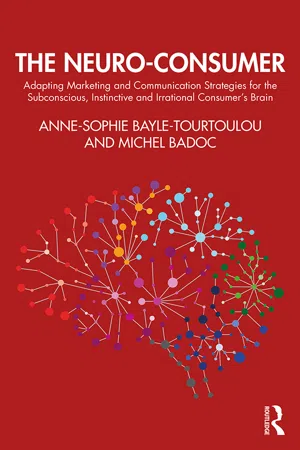
The Neuro-Consumer
Adapting Marketing and Communication Strategies for the Subconscious, Instinctive and Irrational Consumer's Brain
- 322 pages
- English
- ePUB (mobile friendly)
- Available on iOS & Android
The Neuro-Consumer
Adapting Marketing and Communication Strategies for the Subconscious, Instinctive and Irrational Consumer's Brain
About this book
Neuroscientific research shows that the great majority of purchase decisions are irrational and driven by subconscious mechanisms in our brains. This is hugely disruptive to the rational, logical arguments of traditional communication and marketing practices and we are just starting to understand how organizations must adapt their strategies. This book explains the subconscious behavior of the "neuro-consumer" and shows how major international companies are using these findings to cast light on their own consumers' behavior.
Written in plain English for business and management readers with no scientific background, it focuses on:
- how to adapt marketing and communication to the subconscious and irrational behaviors of consumers;
- the direct influence of the primary senses (sight, hearing, smell, taste, touch) on purchasing decisions and the perception of communications by customers' brains;
- implications for innovation, packaging, price, retail environments and advertising;
- the use of "nudges" and artifices to increase marketing and communication efficiency by making them neuro-compatible with the brain's subconscious expectations;
- the influence of social media and communities on consumers' decisions – when collective conscience is gradually replacing individual conscience and recommendation becomes more important than communication; and
- the ethical limits and considerations that organizations must heed when following these principles.
Authored by two globally recognized leaders in business and neuroscience, this book is an essential companion to marketers and brand strategists interested in neuroscience and vital reading for any advanced student or researcher in this area.
Frequently asked questions
- Essential is ideal for learners and professionals who enjoy exploring a wide range of subjects. Access the Essential Library with 800,000+ trusted titles and best-sellers across business, personal growth, and the humanities. Includes unlimited reading time and Standard Read Aloud voice.
- Complete: Perfect for advanced learners and researchers needing full, unrestricted access. Unlock 1.4M+ books across hundreds of subjects, including academic and specialized titles. The Complete Plan also includes advanced features like Premium Read Aloud and Research Assistant.
Please note we cannot support devices running on iOS 13 and Android 7 or earlier. Learn more about using the app.
Information
Part I
The advent of the neuro-consumer
Introduction
Chapter 1
From philosophical theory to neuroscience
The pursuit of happiness and consumer behavior
From philosophical theory to neuroscience
Table of contents
- Cover
- Half Title
- Title Page
- Copyright Page
- Table of Contents
- Acknowledgements
- Introduction
- PART I: THE ADVENT OF THE NEURO-CONSUMER
- PART II: UNDERSTANDING THE NEURO-CONSUMER’S BRAIN
- PART III: THE NEURO-CONSUMER’S BRAIN INFLUENCED BY THE SENSES
- PART IV: THE NEURO-CONSUMER’S BRAIN INFLUENCED BY INNOVATION
- PART V: THE NEURO-CONSUMER’S BRAIN INFLUENCED BY COMMUNICATION
- PART VI: THE NEURO-CONSUMER’S BRAIN INFLUENCED BY THE DIGITAL REVOLUTION
- Selected bibliography
- Index